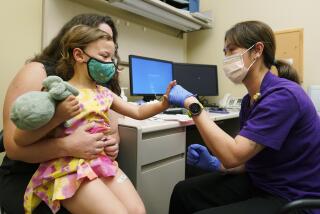At Times, Misery Hates Company
- Share via
You’re in the hospital and you feel pretty awful. Your hair has that cats-just-licked-it look, and if you could, you’d just curl up in a ball and pray that a big bus comes along.
Instead, the door opens, and it’s visitors. Not just one, but a mess of them, and they are ready to party you back to health.
Here, an excerpt just for you--and your guests--from the pages of “How to Survive Your Hospital Stay” (Center Press, 1997), by Judy Burger Crane, a registered nurse.
*
Ah, yes. You’ve just been helped into bed by the nurse after a walk in the hall. You sink back into your pillow with a grateful sigh. Now, for a little nap.
“Hi there!” You are startled awake by a hearty voice. “We thought we’d all come and cheer you up!”
It’s the gang from the office. Six smiling co-workers ring your bed, some holding huge bouquets of flowers, others handing you boxes tied with ribbons.
“It’s See’s candies--your favorite, chocolate-covered marshmallows.”
“Where can I put these flowers? Are there any vases here?”
They’re such good friends. You don’t want to hurt their feelings, but . . .
How can you let your friends know if and when you would like to have visitors? A little advance communication is a good start. If you hate having people around you when you are sick, let everyone know ahead of time that you’ll be open to visitors after you’re home and feeling better. If you would be comforted by seeing caring friends, you could let them know that: Perhaps you could come by for a short visit. I find that I tire very quickly, but I would love to see you.
Here are some useful guidelines for your prospective visitors.
Visitors, Please
* Check with a family member or close friend to see if the patient would like to have visitors. If he is the type who would honestly rather suffer in solitude, respect his wishes.
* Call the hospital to inquire about visiting hours. If the hours are noon to 8 p.m., don’t pop in unexpectedly for a surprise visit at 10 a.m. You might surprise the patient in the middle of a bath. If the patient is in an intensive care unit, visitors might not be permitted except for family members or a significant other. Visiting hours for family might be more flexible in these units. Call the hospital first.
* If you want to bring flowers, make sure the patient is not allergic to them. Keep the bouquet small. Patient rooms are limited in counter or table-top space. Choose a potted plant, or if you bring cut flowers, include a vase. Another possibility is to send or bring flowers to the home after your friend is discharged.
* Short visits are best--10 to 20 minutes. That’s ample time to let him know that you care and find out if he needs anything. However, if your friend indicates that he really wants you to stay and talk or just keep him company, by all means pull up a chair.
* Visit in small groups--two or three people at the most.
* Rather than calling the nurses’ station to find out how your friend is doing, call the family to get an update. Nurses are permitted to give out only general information to non-family.
* If your friend has a roommate, be respectful of his privacy. He might be resting or trying to watch TV. Speak quietly. Ask the roommate if he would like the curtain between the two beds closed.
* Perhaps you are someone who is really uncomfortable around hospitals and sick people. Or maybe you don’t know the patient well enough to pay a visit. That’s OK. You don’t have to show up in person to let your friend know that you are concerned. Patients like getting cards and notes.
* It’s better not to bring food as a gift unless you know that the patient is allowed to have it. The doctor may have ordered that your friend is NPO (nothing by mouth), or is limited as to salt, sugar or fibrous foods.
* Don’t plan to bring your friend his favorite martini. It might not mix too well with his medications. Gift wrap a jar of olives for later use at home instead.
* If you have a cold, cough or flu, stay home, drink lots of fluids and keep your bugs to yourself. Your friend has enough problems without you.
* Try not to bring infants or very small children with you. Considering the multitude of bacteria and viruses, hospitals are not great places for susceptible little ones.
There are a few exceptions. One might be an obstetrics unit where siblings are allowed to visit a new baby brother or sister. In another case, family might arrange to bring a nursing infant in to a mother hospitalized with an unrelated medical problem. A third exception would be a child who is distraught over Daddy or Grandma being in the hospital and who would be reassured if only he might see for himself that everything is OK and get a big hug. In this case, the family could ask the nurse if there is a lounge where the patient could be brought to have a visit with the child.
* It can be uncomfortable, even painful, for the patient if visitors sit or lean on his bed.
* If it is a two-bed room and the other bed is vacant, don’t sit on or lay your coats and purses on the empty bed. It must be kept clean for the next patient. Ask the nurse for an extra chair.
* If you need to use the bathroom, ask someone where the public restrooms are. Patient bathrooms are for their use only.
* Don’t talk about your aches and pains or your Uncle Joe who had the same surgery and ended up paralyzed.
* You might be visiting during your lunch break, but eat your pastrami sandwich before you come in to the hospital. Strong food odors make some people nauseated when they are not feeling well.
* Your friend may or may not feel like talking about his surgery or illness. Let him guide the conversation. And, by all means, don’t suggest treatments that he could have sought if only he had asked you, the medical guru.
*
And now, if you are looking for something to bring the patient other than flowers or candy, here are some suggestions:
* A magazine your friend doesn’t usually see.
* The loan of your Walkman and several music tapes, audio books, or a portable CD player with discs.
* A pretty box of note cards with the envelopes already stamped (include a pen).
* A current TV guide.
* A pair of outrageous socks for keeping feet warm at night. Go crazy--get something with a wild design.
* Have everyone at the office sign a “get well soon” card.
* A box of body powder or hand lotion.
* Anything handmade by a child.
* A gift certificate good for a personally delivered home-cooked meal when the patient goes home.
* The daily paper.
* “From “How to Survive Your Hospital Stay,” by Judy Burger Crane (Center Press, 1997). Reprinted with permission from the publisher.
More to Read
Sign up for The Wild
We’ll help you find the best places to hike, bike and run, as well as the perfect silent spots for meditation and yoga.
You may occasionally receive promotional content from the Los Angeles Times.






